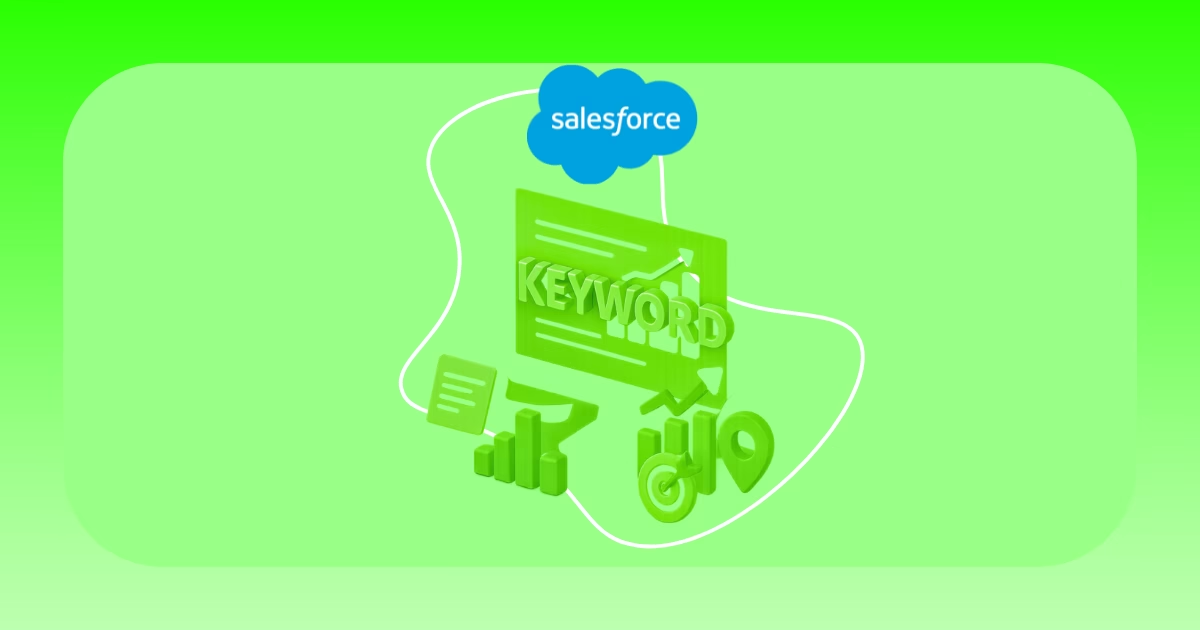Off-Page SEO Strategy for Salesforce Partners – Backlink Opportunities You Can’t Miss
- Updated onJuly 21, 2025
According to a recent survey, 67.5% of SEOs believe backlinks impact search engine rankings, highlighting how crucial off-page efforts are for boosting visibility and authority.
For Salesforce partners, off-page SEO goes beyond links—it’s about building authority, trust, and strong digital relationships that attract high-quality leads and position your services as industry-leading solutions.
Salesforce dominates the CRM market with a 21.7% share, which means competition for visibility is fierce. Strong off-page strategies like backlinks, PR, and social signals can help Salesforce partners stand out in search results.
Hello, I’m Tarun Bisen. In this blog, I’ll dive into off-page SEO for Salesforce partners. My goal is to equip you with actionable insights to boost your website authority and drive organic traffic through proven off-page techniques.
Let me show you how.
Must check out this complete guide on SEO for Salesforce
Understanding Off-Page SEO for Salesforce Partners
From my experience, off-page SEO for Salesforce partners is the key to building authority and driving organic traffic beyond your website. Ignoring it means losing valuable opportunities for backlinks, mentions, and partnerships that strengthen your search rankings.
I’ve seen Salesforce partners struggle to gain visibility because they overlook off-page factors like backlinks, brand mentions, and social signals—areas that search engines value highly.
Why Off-Page SEO Matters for Salesforce Partners:
- Builds authority through high-quality backlinks
- Increases referral traffic from trusted sources
- Boosts brand visibility and trust within the Salesforce ecosystem
- Supports faster ranking for competitive Salesforce service keywords
Without strong off-page SEO, your competitors will dominate search results, earning backlinks and mentions that should be driving traffic to your Salesforce services. Don’t let them outshine you.
With The Salesforce economy, powered by AI, projected to generate $2.02 trillion in worldwide business revenues between 2022 and 2028, competition for visibility is intense. Off-page SEO is how you can gain authority, attract backlinks, and help Salesforce partners stand out.
Off-Page SEO for Salesforce Partners: Where to Get Quality Backlinks From
I’ve learned that off-page SEO for Salesforce partners thrives on quality backlinks from trusted sources, boosting authority, rankings, and organic traffic.


Let’s dive in to see how you can get quality backlinks.
1. Salesforce Ecosystem-Specific Backlinks
- Salesforce AppExchange
I always leverage Salesforce AppExchange by listing services with backlinks to my site. With its high domain authority and Salesforce audience, it consistently drives qualified traffic and strengthens my off-page SEO profile. - SalesforceBen
Contributing guest posts on SalesforceBen (check out one of my blogs), one of the largest Salesforce blogs, has boosted my rankings. Backlinks from here build authority and drive targeted traffic from Salesforce professionals. - Forcetalks
I frequently share Salesforce-focused articles on Forcetalks, earning backlinks while reaching a highly relevant audience. It’s been a key source for building backlinks and driving Salesforce-related traffic. Also, get listed here to attract qualified leads. - Trailblazer Community
By actively engaging in Trailblazer groups, provide valuable insights with backlinks to your content. This not only drives Salesforce-focused traffic but also boosts your credibility within the community. - Salesforce Developer Community
Sharing technical blogs and participating in discussions here can help you earn backlinks from the Salesforce developer audience, helping you rank for technical Salesforce-related keywords.
2. High-Authority Business Listings
- G2
G2 is a trusted software review platform with high domain authority. A well-optimized profile with backlinks can drive traffic and enhance search engine trust. - SelectedFirms
SelectedFirms.co is a specialized platform that lists top IT and marketing service providers. A profile here can generate valuable backlinks and increase visibility among businesses searching for Salesforce consultants. - TrustRadius
TrustRadius is a review site for B2B software and services. Backlinks from here add authority, as search engines value its trusted, user-generated content. - Clutch
Clutch.co ranks service providers based on client reviews. Earning backlinks from Clutch profiles and awards pages can significantly boost off-page SEO for Salesforce-focused services. - DesignRush
DesignRush is a directory for agencies and consultants. Being listed under Salesforce services can generate high-quality backlinks and targeted leads. - GoodFirms
GoodFirms is a B2B research and review platform. A verified listing with backlinks on GoodFirms can improve search engine rankings and drive relevant traffic.
3. Social Media Content Platforms
- LinkedIn
Salesforce partners can create a well-optimized LinkedIn profile highlighting their services and linking to their website. Sharing articles, joining Salesforce groups, and engaging with industry discussions often leads to shares and reposted content that generate backlinks. - Twitter (X)
Add your website link to your profile and tweet Salesforce service insights using relevant hashtags like #SalesforcePartners. This increases visibility and may attract citations from industry round-ups and blogs, building quality backlinks. - Facebook
Creating a dedicated Facebook business page with a website link and participating in Salesforce-related groups can drive traffic and backlinks. Group discussions, page shares, and partnerships within the Salesforce community often result in valuable links. - Instagram
Salesforce partners can optimize their Instagram profile with a website link in the bio and post content about their services. Reels, stories, and carousels showcasing client success stories can attract backlinks from profiles referencing their content. - Threads
Building a profile on Threads and participating in discussions within the Salesforce ecosystem can help secure backlinks through mentions, quoted posts, and collaborations. - Pinterest
Salesforce partners can create an optimized Pinterest profile with boards dedicated to Salesforce service infographics, each linked to their site. When pins are shared or featured on external websites, they gain valuable backlinks.
4. Blogging Platform
- Medium
Salesforce partners can create a blog on Medium to share insights, case studies, and Salesforce best practices. Medium’s large audience and high domain authority increase the chances of earning backlinks when others reference their posts. - LinkedIn
Publishing articles directly on LinkedIn helps Salesforce partners engage their professional network while earning backlinks from shares and citations. LinkedIn’s SEO-friendly articles often rank well on search engines. - Dev.to
Dev.to is an ideal platform for sharing technical content, such as Salesforce development tips, API integrations, and automation guides. It’s popular with developers, making it easier to earn backlinks from technical blogs and forums. - Hashnode
Hashnode allows Salesforce partners to publish technical blogs with a custom domain. Articles shared within the developer community can attract backlinks from newsletters, forums, and coding resources. - Substack
Salesforce partners can use Substack to publish newsletters focused on Salesforce trends, case studies, and industry insights. Substack articles are often shared widely, earning backlinks from other publications and industry round-ups.
5. Guest Posting Opportunities
Guest posting on niche Salesforce platforms is a powerful off-page SEO strategy for Salesforce partners. It helps you earn high-quality backlinks, increase visibility within the Salesforce community, and establish authority in your domain. Here are some top platforms for guest contributions:
- sfapps.info
A dedicated platform for Salesforce apps and solutions. You can share app reviews, integration guides, or case studies to attract Salesforce professionals and gain valuable backlinks. - SalesforceBen
The largest Salesforce community blog (check out my another blog). Guest posting here helps you connect with Salesforce admins, developers, and consultants while securing backlinks from a highly authoritative domain. - Forcetalks
A leading Salesforce community hub. You can publish blogs, videos, and tutorials, positioning yourself as a thought leader while earning backlinks from a trusted Salesforce-centric platform. - Focus on Force
Known for Salesforce certification resources, this platform allows you to contribute exam guides, study tips, or Salesforce project insights to reach learners and professionals alike. - Salesforcegeek
A fast-growing Salesforce blog and YouTube community. Publishing guest articles on Salesforcegeek can help you engage with a technical audience and earn quality backlinks. - Sfdc99
A platform famous for Salesforce coding tutorials. Sharing guest posts on topics like Salesforce development best practices or Apex code examples helps you reach developers and secure backlinks. - Salesforcetrail
A community blog dedicated to Salesforce beginners and professionals. You can publish tutorials, career tips, and Salesforce use cases to engage the Salesforce community and earn backlinks.
6. Competitor Backlink Analysis
Analyzing competitor backlinks helps Salesforce partners uncover high-authority sites linking to their rivals. By targeting these sources, you can replicate their strategies and secure valuable backlinks for your site.
Using tools like Ahrefs or Semrush, you can identify competitor backlink profiles, spot guest post opportunities, and discover industry directories. This approach boosts your off-page SEO and helps you compete effectively in Salesforce-related search results.
7. Online Communities, Forums & Q&A Sites
- Trailblazer Community
Salesforce’s official community platform where you can answer questions, join group discussions, and showcase your expertise. Active participation can attract potential clients seeking Salesforce solutions. - Reddit (r/salesforce)
A popular subreddit where Salesforce professionals discuss challenges, updates, and best practices. Engaging in discussions and offering solutions helps you build credibility and drive traffic to your website. - Quora
A Q&A platform where you can answer Salesforce-related questions and demonstrate your knowledge. Providing detailed, helpful responses can establish you as an expert and attract potential leads. - Salesforce Stack Exchange
A technical Q&A site for Salesforce developers and administrators. Answering questions here helps you connect with a technical audience and showcase your problem-solving skills.
Pro Tip: Many forums restrict direct backlinks, but regularly participating in discussions, answering queries, and providing solutions not only builds your authority but can also generate leads directly from engaged users.
8. Local SEO & Industry Directories
Local SEO plays a crucial role in off-page SEO for Salesforce partners, especially for attracting clients from specific regions. By listing your business on reputable directories, you enhance visibility, build trust, and drive local traffic to your website. Here are essential platforms to leverage:
- Google Business Profile
A must-have for local SEO. Create and optimize your profile with Salesforce service keywords, client reviews, and regular updates to appear in local search results and Google Maps. - Yelp for Business
Popular for customer reviews. Claim your profile and encourage happy clients to leave feedback. Positive reviews can build trust and attract more local leads. - Alignable
A business networking platform for local businesses. Connect with other Salesforce service providers, build referrals, and collaborate with potential clients. - Chamber of Commerce Sites
Listing in local or regional chamber directories boosts credibility and helps you connect with local businesses seeking Salesforce solutions. - Yellow Pages
A classic business directory still used for local search. Ensure your Salesforce services are listed with accurate contact details to reach local clients. - Bing Maps
Claiming your business on Bing Places increases your visibility on Bing search results and maps, capturing traffic from users outside the Google ecosystem. - FourSquare
A location-based directory that helps you reach local customers. Maintaining a profile here can improve your local SEO signals and attract leads through user reviews.
Pro Tip: Keep your business name, address, and phone number (NAP) consistent across all directories.
9. Social Bookmarking Sites
Social bookmarking is a valuable off-page SEO strategy for Salesforce partners. These platforms help you share, organize, and promote your content, driving referral traffic and building backlinks. Here are key sites to leverage:
- Instapaper
Allows users to save articles and web pages. By sharing insightful Salesforce content, you can attract readers who may bookmark and share your pages. - Flipboard
Create and curate Salesforce-related magazines. Flipboard’s content-sharing model can drive traffic from niche audiences interested in technology and business services. - Pearltrees
Organize and share collections of Salesforce resources, blogs, and case studies. It’s a great tool for building content clusters that other users can follow and share. - Diigo
A social bookmarking tool that allows you to annotate and highlight Salesforce-related content. You can share your annotated pages with your network to drive traffic. - Digg
A content-sharing platform known for trending articles. Submit your Salesforce articles or case studies to reach a broader audience and earn backlinks. - Plurk
A microblogging and social bookmarking site. Share Salesforce tips, updates, and blog links to engage with a tech-focused community.
10. Digital PR and Industry Publications
Digital PR is a powerful off-page SEO tactic for Salesforce partners, helping you gain backlinks, boost brand authority, and reach a wider audience. Here are some platforms where you can distribute press releases or get featured:
- Online PR News
A popular platform for press release distribution. Share news about Salesforce services, product launches, or achievements to gain visibility and backlinks. - PR Log
A free press release distribution service that helps promote your Salesforce solutions and drive traffic from authoritative sources. - OnlyWire
A content distribution tool that shares your Salesforce-related press releases or blog updates across multiple social networks. - Free PR Now
Ideal for sharing press releases without a budget. Announce Salesforce partnership milestones or service updates to reach industry audiences. - Press Release Point
Distribute Salesforce-focused press releases targeting business and technology audiences, earning backlinks and improving search engine visibility. - PRWeb
A paid PR service known for its extensive distribution network. Ideal for Salesforce partners looking to boost their visibility in search results and news portals. - BusinessWire
A premium press release platform that helps Salesforce partners gain coverage in major publications and business networks. - CMSWire
A digital magazine covering customer experience and digital marketing. Pitch Salesforce success stories or thought leadership articles to reach decision-makers.
How to Craft a Winning Off-Page SEO Strategy
From my experience, off-page SEO is about building authority beyond your website. Here’s my step-by-step approach to building backlinks and boosting search rankings for Salesforce partners:
Step 1. Conduct Competitor Backlink Analysis
I start with tools like Ahrefs and Semrush to analyze where Salesforce competitors get their backlinks. This helps me identify high-authority sites and replicate their strategies.
Step 2. Build Salesforce-Specific Backlinks
I prioritize platforms like SalesforceBen, Forcetalks, and the Trailblazer Community because backlinks from Salesforce-specific sites drive relevant traffic and improve niche authority.
Step 3. Secure Listings on Business Directories
I submit Salesforce partner profiles to directories like Clutch, GoodFirms, and AppExchange to build trust signals and gain referral traffic.
Step 4. Leverage Social Media Platforms
I actively share blog posts on LinkedIn, Twitter, and Reddit (r/salesforce) to boost content reach and drive engagement within the Salesforce community.
Step 5. Contribute Guest Posts
I write for Salesforce-focused blogs like SalesforceBen and Forcetalks to earn backlinks and showcase expertise to the audience.
Step 6. Engage in Online Communities
I participate in forums like Quora and Salesforce Stack Exchange, answering questions to drive leads and build authority—even when direct link sharing isn’t allowed.
Step 7. Use Local SEO Directories
Optimize Google Business Profile and get listed on local directories like Yelp and Chamber of Commerce sites to enhance local search visibility.
Step 8. Share Content on Bookmarking Platforms
I distribute blog posts on bookmarking sites like Flipboard and Pocket to drive referral traffic and gain easy-to-earn backlinks.
Step 9. Publish Press Releases on Industry Sites
I submit news and achievements to platforms like PRWeb, BusinessWire, and CMSWire to gain backlinks from trusted media sources.
Step 10. Monitor and Disavow Bad Backlinks
Finally, regularly auditing your backlink profile helps maintain a healthy link profile. Tools like Google Search Console and SEMrush’s Backlink Audit are useful for identifying harmful links.
Personally, I prefer SEMrush for spotting toxic backlinks and compiling a disavow file to submit via Google’s Disavow Tool.
However, Google advises caution when disavowing links, as it’s often unnecessary unless the backlinks come from sites with very high spam scores. In such cases, disavowing can prevent potential ranking penalties.
Also, don’t forgot to explore On-Page SEO for Salesforce
Best Practices and Tips
- Focus on building backlinks from high DA/PA websites for stronger authority.
- Always check the spam score before acquiring backlinks to avoid penalties.
- Prioritize industry-specific backlinks from Salesforce communities and tech blogs.
- Diversify your backlink profile with a mix of dofollow and nofollow links.
- Contribute guest posts on relevant platforms to gain quality backlinks.
- Use competitor analysis tools to find backlink opportunities from similar websites.
- Participate in online communities and forums to earn organic backlinks.
- Build local citations and business directory profiles to improve local SEO.
- Leverage social media platforms to promote content and earn backlinks.
- Regularly monitor your backlink profile and disavow harmful links to maintain site health.
Trailhead Takeaways
We’ve covered a lot in this guide, haven’t we? From ecosystem-specific backlinks to competitor analysis and digital PR strategies, I hope you now have a clear roadmap for your off-page SEO for Salesforce partner.
Here are the key lessons from this guide to strengthen your off-page SEO:
- Focus on Salesforce-specific platforms.
- Build profiles and share content onSocial Media.
- Secure backlinks from high-authority directories.
- Contribute guest posts.
- Engage in online communities.
- Use social bookmarking sites.
- Leverage digital PR.
- Analyze competitor backlinks.
- Monitor and disavow toxic backlinks.
As someone who’s walked this trail for years, I can confidently say that a strong off-page SEO strategy is a game-changer for Salesforce partners.
Now it’s your turn—implement these strategies, stay consistent, and track your results to see your authority grow and rankings improve.
Tarun Bisen is an SEO strategist specializing in Salesforce and digital marketing. He helps businesses improve search rankings and generate leads. Passionate about SEO, technology, and industry trends, he shares insights on ranking strategies and organic growth.
Most Recent Posts
The best trails are the ones we blaze together. Thanks for exploring with me at SEO Trailhead—cheers to your growth!



